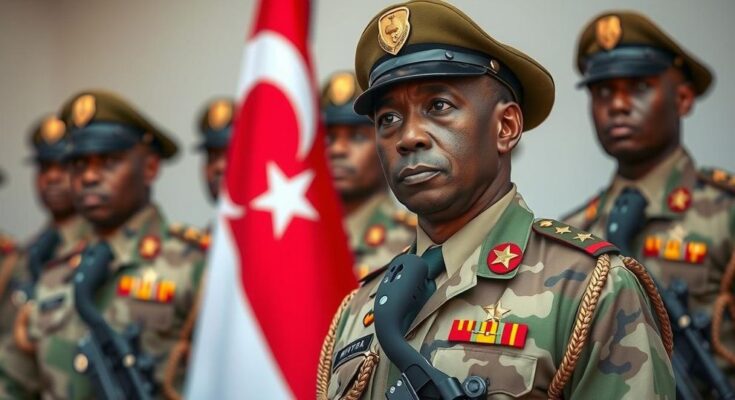Sudan’s army chief, Abdel Fattah al-Burhan, welcomed a Turkish proposal to mediate in the ongoing 20-month conflict with the RSF. Turkish President Erdogan’s initiative aims to stabilize Sudan amidst foreign intervention concerns. Both Turkey and the UAE expressed readiness to coordinate diplomatic efforts, while the conflict continues to result in significant casualties and humanitarian crises.
The chief of Sudan’s army has expressed support for Turkey’s offer to mediate in the ongoing conflict that has lasted for 20 months between the Sudanese Armed Forces and the paramilitary Rapid Support Forces (RSF). This development follows a conversation between Turkish President Recep Tayyip Erdogan and Sudan’s military leader, Abdel Fattah al-Burhan, who conveyed to Turkey’s deputy foreign minister, Burhanettin Duran, Sudan’s endorsement of the Turkish initiative aimed at fostering peace and stability in the war-torn nation. Sudanese Foreign Minister Ali Youssef highlighted the necessity of having allies like Turkey to achieve lasting peace in the country.
President Erdogan, during his call, proposed Turkey’s involvement in resolving tensions not only between Sudan and the RSF but also in curtailing foreign interferences from nations such as the United Arab Emirates (UAE). Sudan’s army leadership has consistently accused the UAE of backing the RSF, a claim supported by external observers, although the UAE has denied these allegations. Only recently, the Sudanese government implicated the RSF in utilizing drones allegedly assembled with assistance from the UAE, further complicating diplomatic relations.
In response to these allegations, the UAE has asserted it will no longer support armament initiatives for the paramilitary groups embroiled in the conflict. Following discussions with Burhan, Deputy Minister Duran affirmed Turkey’s commitment to mobilizing regional partners to navigate the challenges of establishing peace in Sudan. The UAE has shown willingness to collaborate with Turkey towards achieving a comprehensive resolution of the crisis. This persistent conflict has resulted in tens of thousands of casualties and the displacement of millions, pushing Sudan to the verge of a humanitarian catastrophe.
The complexity of the Sudanese conflict, characterized by the strife between army forces and the RSF, reflects the deep-rooted political and social issues intertwined with external influences. Analysts caution that intensifying foreign involvement may exacerbate the prevailing humanitarian situation rather than alleviate it, underscoring the urgency for cohesive diplomatic action.
The conflict in Sudan has escalated over the last 20 months, primarily pitting the Sudanese Army against the RSF, a paramilitary group led by Mohamed Hamdan Daglo. Since the ousting of Omar al-Bashir in 2019, political instability has surged, and ethnic divisions have been exacerbated by foreign interventions. With the UAE alleged to be backing the RSF, the international community remains vigilant, monitoring the situation as diplomatic efforts emerge to restore peace and stability. The humanitarian crisis has reached alarming levels, complicating the pursuit of a resolution.
In summary, the endorsement of Turkey’s peace initiative by Sudan’s army leadership signifies a potential shift towards diplomatic engagement in resolving the protracted conflict with the RSF. The involvement of Turkey and the willingness of the UAE to coordinate efforts reflect a constructive approach to mitigating the violence. However, the situation remains precarious, and the path to sustainable peace requires concerted efforts from all stakeholders.
Original Source: www.newarab.com




